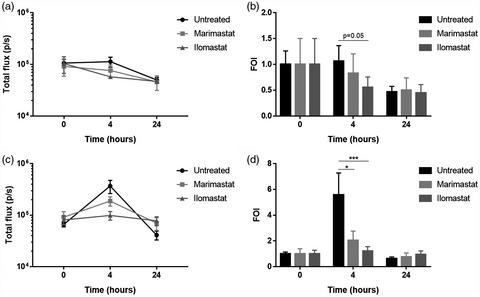当前位置:
X-MOL 学术
›
Clin. Exp. Immunol.
›
论文详情
Our official English website, www.x-mol.net, welcomes your feedback! (Note: you will need to create a separate account there.)
Protease inhibitors elicit anti-inflammatory effects in CF mice with Pseudomonas aeruginosa acute lung infection.
Clinical & Experimental Immunology ( IF 4.6 ) Pub Date : 2020-09-18 , DOI: 10.1111/cei.13518 A Sandri 1 , M M Lleo 1 , C Signoretto 1 , M Boaretti 1 , F Boschi 2
Clinical & Experimental Immunology ( IF 4.6 ) Pub Date : 2020-09-18 , DOI: 10.1111/cei.13518 A Sandri 1 , M M Lleo 1 , C Signoretto 1 , M Boaretti 1 , F Boschi 2
Affiliation

|
Pseudomonas aeruginosa is the major respiratory pathogen in patients with cystic fibrosis (CF). P. aeruginosa‐secreted proteases, in addition to host proteases, degrade lung tissue and interfere with immune processes. In this study, we aimed at evaluating the possible anti‐inflammatory effects of protease inhibitors Marimastat and Ilomastat in the treatment of P. aeruginosa infection. Lung infection with the P. aeruginosa PAO1 strain was established in wild‐type and cystic fibrosis transmembrane conductance regulator (CFTR) knock‐out C57BL/6 mice expressing a luciferase gene under control of bovine interleukin (IL)‐8 promoter. After intratracheal instillation with 150 µM Marimastat and Ilomastat, lung inflammation was monitored by in‐vivo bioluminescence imaging and bacterial load in the lungs was assessed. In vitro, the effects of protease inhibitors on PAO1 growth and viability were evaluated. Acute lung infection was established in both wild‐type and CFTR knock‐out mice. After 24 h, the infection induced IL‐8‐dependent bioluminescence emission, indicating lung inflammation. In infected mice with ongoing inflammation, intratracheal treatment with 150 µM Marimastat and Ilomastat reduced the bioluminescence signal in comparison to untreated, infected animals. Bacterial load in the lungs was not affected by the treatment, and in vitro the same dose of Marimastat and Ilomastat did not affect PAO1 growth and viability, confirming that these molecules have no additional anti‐bacterial activity. Our results show that inhibition of protease activity elicits anti‐inflammatory effects in cystic fibrosis (CF) mice with acute P. aeruginosa lung infection. Thus, Marimastat and Ilomastat represent candidate molecules for the treatment of CF patients, encouraging further studies on protease inhibitors and their application in inflammatory diseases.
中文翻译:

蛋白酶抑制剂在铜绿假单胞菌急性肺部感染的 CF 小鼠中引起抗炎作用。
铜绿假单胞菌是囊性纤维化 (CF) 患者的主要呼吸道病原体。除了宿主蛋白酶外,铜绿假单胞菌分泌的蛋白酶还会降解肺组织并干扰免疫过程。在这项研究中,我们旨在评估蛋白酶抑制剂 Marimastat 和 Ilomastat 在治疗铜绿假单胞菌感染中可能的抗炎作用。在野生型和囊性纤维化跨膜电导调节器 (CFTR) 敲除 C57BL/6 小鼠中建立了铜绿假单胞菌PAO1 菌株的肺部感染,该C57BL/6 小鼠在牛白细胞介素 (IL)-8 启动子的控制下表达荧光素酶基因。气管内滴注 150 µM Marimastat 和 Ilomastat 后,肺部炎症通过评估了体内生物发光成像和肺部细菌负荷。在体外,评估了蛋白酶抑制剂对 PAO1 生长和活力的影响。在野生型和 CFTR 敲除小鼠中均建立了急性肺部感染。24 小时后,感染诱导 IL-8 依赖性生物发光发射,表明肺部炎症。在具有持续炎症的感染小鼠中,与未经治疗的感染动物相比,用 150 µM Marimastat 和 Ilomastat 进行气管内治疗降低了生物发光信号。肺中的细菌负荷不受治疗影响,并且在体外相同剂量的 Marimastat 和 Ilomastat 不影响 PAO1 的生长和活力,证实这些分子没有额外的抗菌活性。我们的结果表明,蛋白酶活性的抑制在患有急性铜绿假单胞菌肺部感染的囊性纤维化 (CF) 小鼠中引起抗炎作用。因此,Marimastat 和 Ilomastat 代表了治疗 CF 患者的候选分子,鼓励进一步研究蛋白酶抑制剂及其在炎症性疾病中的应用。
更新日期:2020-09-18
中文翻译:

蛋白酶抑制剂在铜绿假单胞菌急性肺部感染的 CF 小鼠中引起抗炎作用。
铜绿假单胞菌是囊性纤维化 (CF) 患者的主要呼吸道病原体。除了宿主蛋白酶外,铜绿假单胞菌分泌的蛋白酶还会降解肺组织并干扰免疫过程。在这项研究中,我们旨在评估蛋白酶抑制剂 Marimastat 和 Ilomastat 在治疗铜绿假单胞菌感染中可能的抗炎作用。在野生型和囊性纤维化跨膜电导调节器 (CFTR) 敲除 C57BL/6 小鼠中建立了铜绿假单胞菌PAO1 菌株的肺部感染,该C57BL/6 小鼠在牛白细胞介素 (IL)-8 启动子的控制下表达荧光素酶基因。气管内滴注 150 µM Marimastat 和 Ilomastat 后,肺部炎症通过评估了体内生物发光成像和肺部细菌负荷。在体外,评估了蛋白酶抑制剂对 PAO1 生长和活力的影响。在野生型和 CFTR 敲除小鼠中均建立了急性肺部感染。24 小时后,感染诱导 IL-8 依赖性生物发光发射,表明肺部炎症。在具有持续炎症的感染小鼠中,与未经治疗的感染动物相比,用 150 µM Marimastat 和 Ilomastat 进行气管内治疗降低了生物发光信号。肺中的细菌负荷不受治疗影响,并且在体外相同剂量的 Marimastat 和 Ilomastat 不影响 PAO1 的生长和活力,证实这些分子没有额外的抗菌活性。我们的结果表明,蛋白酶活性的抑制在患有急性铜绿假单胞菌肺部感染的囊性纤维化 (CF) 小鼠中引起抗炎作用。因此,Marimastat 和 Ilomastat 代表了治疗 CF 患者的候选分子,鼓励进一步研究蛋白酶抑制剂及其在炎症性疾病中的应用。


























 京公网安备 11010802027423号
京公网安备 11010802027423号